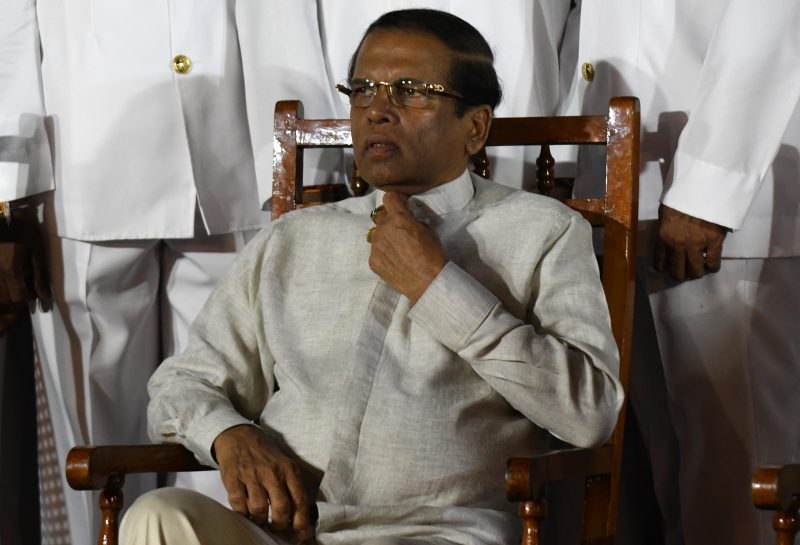Sri Lanka MPs defy president to resume Easter attack probe
Sri Lanka’s parliament has defied President Maithripala Sirisena and resumed hearings into security lapses surrounding the Easter suicide bombings (LAKRUWAN WANNIARACHCHI)
Colombo (AFP) – Sri Lanka’s parliament Tuesday defied President Maithripala Sirisena and resumed investigations into security lapses surrounding the Easter suicide bombings that killed 258 people, officials said, as a political crisis in the country deepened.
The Parliamentary Select Committee (PSC) began hearing testimony from Muslim leaders who claimed they repeatedly alerted the authorities to dangerous radicalisation, a parliamentary official said.
In what appeared to be a tit-for-tat move, Sirisena did not call the routine weekly cabinet meeting to discuss the day-to-day running of the administration.
The opposition Sri Lanka People’s Front said the standoff between the president and the cabinet, controlled by Prime Minister Ranil Wickremesinghe’s party, meant the government was at a standstill.
“The current standoff effectively means that there is no government in Sri Lanka from today,” Sri Lanka Freedom Party (SLPF) leader Gamini Lakshman Peiris told reporters in Colombo.
There was no immediate word either from the president or the prime minister on why the scheduled cabinet meeting was not held.
Sirisena had militantly opposed public questioning of military, police and intelligence officials, saying it would compromise national security. The PSC maintains that witnesses were free to give evidence in camera.
President Sirisena last week asked his coalition cabinet to stop the hearings, which have already revealed senior officials directly under him had ignored repeated intelligence warnings.
Sirisena sacked his intelligence chief over the weekend after he told the hearing that the April 21 attacks could have been avoided if police had been allowed to arrest the ringleader as early as last year.
An Islamic State-inspired local jihadist group has been blamed for the suicide attacks against three churches and three luxury hotels. Among the dead were 45 foreign nationals, while nearly 500 people were injured.
– Church reopens –
One of the badly damaged churches, St. Anthony’s, was scheduled to reopen for regular services Wednesday, church officials said in a sign of normality returning to the otherwise tense capital.
Two of the luxury hotels which were attacked have reopened, while the Shangri-La was also due to reopen on Wednesday.
Since the attacks, the country has been under a state of emergency which gives sweeping powers to the police and security forces to arrest and detain suspects for long periods of time.
Sirisena has insisted that as minister of defence and law and order he was unaware of precise intelligence warnings from India over the attacks.
He sacked his defence ministry secretary, Hemasiri Fernando, and suspended police chief Pujith Jayasundara after blaming them for the catastrophic security failure.
Both have denied responsibility while the police chief has mounted a legal challenge against his suspension. Jayasundara has testified before the PSC.
Sirisena said he will not allow any current public servants to testify before the hearing, but parliament warned Sunday that any official refusing its summons could face up to 10 years in jail.
It was not immediately clear if the PSC had asked any official to testify since Sirisena’s remarks on Friday.
The president also ordered live broadcasts of the PSC proceedings to be halted.
New Delhi said it shared detailed information about the Sri Lanka attack with Colombo as early as April 4 — two and a half weeks before the bombings — following information gleaned from a jihadist in Indian custody.
Disclaimer: Validity of the above story is for 7 Days from original date of publishing. Source: AFP.


